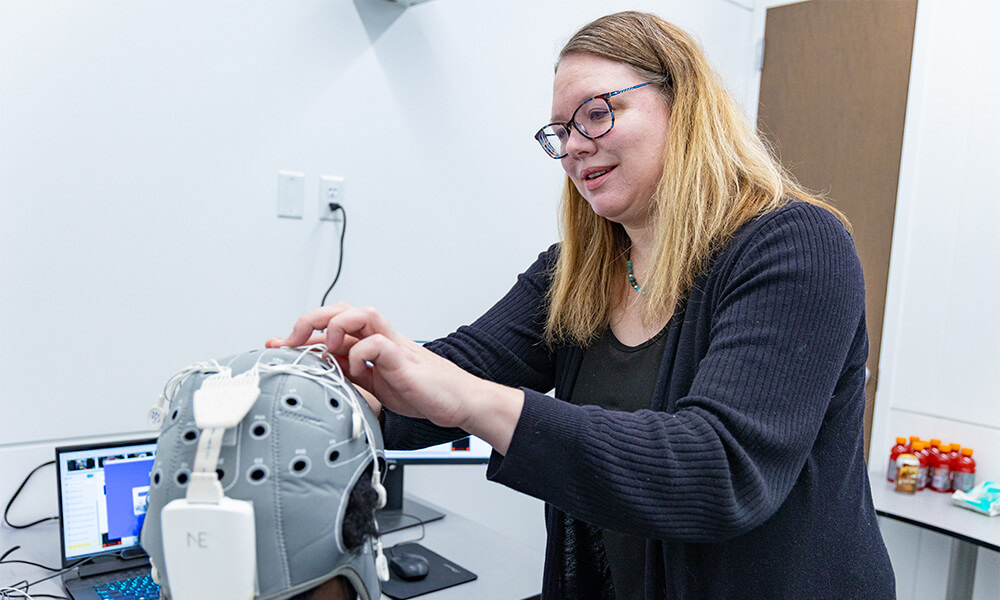
A Concordia business professor is delving into the science of de-stressing with the help of the university’s neuromarketing lab.
The lab, located on the second floor of CUW’s Robert W. Plaster Free Enterprise Center, allows researchers to monitor things like heart rate, brainwave activity, eye tracking, and skin response to study how people’s brains and bodies respond to messages and content.
Associate Professor of Marketing Angela Belz, PhD, oversees the lab. This past academic year, she put the space to use with the help of a grant from a start-up company, called Joystik Life, which is a partner of the university’s CU Ventures initiative. Founded by Christian Stoll and Sarah Pierce, MD, Joystik Life’s mission is to empower people to control their body’s physiological responses to stress by allowing them to introduce quick, easy-to-use autogenic training routines into their daily lives via an app. The app is scientifically backed and is designed to help users level up in life with increased performance, enhanced focus, increased resilience, better sleep, reduced stress, and even, better skin complexion.
Joystik also incorporates conditioning to provide an on-demand element within its app. “The science is similar to classical conditioning, like with Pavlov’s dogs,” explains Belz. “If it’s working, the subject’s brain should go into a resting state sooner than without it.”
The concept is simple enough, but how effective is it? That’s what Belz set out to assess.
Studying the app’s efficacy through neuroscience
Belz recruited 40 CUW student-athlete volunteers to participate in her data collection effort. Over the span of four months, Belz logged more than 120 visits to the neuromarketing lab (three visits per participant). She exposed participants to a series of horror movie scenes to elevate their heart rate. At the end of the screenings, the control group would close their eyes and listen to nature sounds, while the others would listen to the Joystick app. All the while, Belz collected their heart rate and galvanic skin response (GSR) data.
Belz is currently sorting through her massive catalogue of data to compile the results, but preliminary findings have shown that there are benefits students who used the app.
It’s just the start of tapping the potential of the neuromarketing lab, which is in existence at Concordia largely thanks to a grant received by President of University Venture Affiliates Dan Sem, PhD. Belz sees ample opportunities for classroom applications and, even, revenue generation for the university down the line.
“It’s cutting-edge technology that not a lot of companies have ready access to, especially smaller start-ups who oftentimes have the most mission-aligned motives behind their efforts,” said Belz. “For students, they can gain this really unique skillset that not many universities are equipped to teach. It’s about preparing our students to be smart practitioners in the real world.”
Want in?
The Batterman School of Business at CUW offers a complete range of business education programs and degrees including associate and bachelor’s degrees for undergraduate and accelerated adult students, licensures, and certifications. Graduate programs include the highly ranked Master’s of Business Administration (with 13 concentrations), Master’s in Leadership, Accountancy, Business Analytics, a Doctor of Business Administration, and a PhD in Business Administration.
Business undergraduate students also participate in the Concordia Core, a rigorous, liberal arts curriculum integrated with Lutheran distinctives.